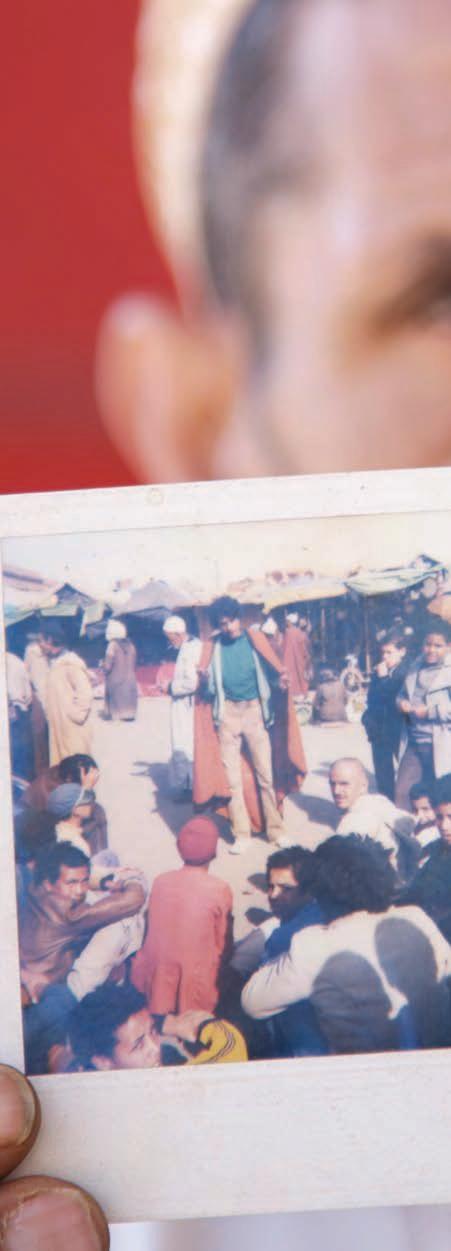
























































































Storylinesis the magazine of the Society for Storytelling( To submit articles and reviews for future editions* please contact the editor at storylines@sfs(org(uk(
Edited and designed by Simon Heywood( Proof-read by Liz Berg. Original design by Mike Carter( www(mikesplace(org(uk
Registered Charity #"$!"+, Company Limited by Guarantee -England and Wales. reg( no( +#+/#!"
Founding Patron: Eileen Colwell Patrons: Kevin Crossley Holland Grace Hallworth Ta0y Thomas MBE Marina Warner DBE Prof( Jack Zipes
How to contact us www(sfs(org(uk admin@sfs(org(uk
The Morgan Library* Aston Street* Wem* Shropshire SY& $AU "2$+& $2,+,3
Christine Willison -Chair. chair@sfs(org(uk Mike Forbes - Treasurer. )nance@sfs(org(uk Chip Colquhoun -Secretary. secretary@sfs(org(uk
Administrator Ali Quarr4ll admin@sfs(org(uk
Publications
Simon Heywood storylines@sfs(org(uk
Email news bulletin -members only. Kevin Blackburn sfs@fairbruk(demon(co(uk
Special interest groups for health and wellbeing Janet Dowling
Area networks Chip Colquhoun Martin Manasse north@areas(sfs(org(uk Pippa Reid south@areas(sfs(org(uk
National Storytelling Week Del Reid reidthewords@hotmail(com
EDITORIAL555&
FEATURES
Visual E0ects: Storytelling DVDs and apps in the classroom
Maria Brosnan $
6Alive in All Its Beauty:7 The work of the Song Collectors Collective James McDonald ##
The Voice of the Medina: The Hlaykia of Marrakech Simon Heywood !!
Tet48s Tales: Storytelling in Syria Joseph Green !7
STORY OF THE SEASON
The Woodcutter and the Lion: A Folktale from Deir%al%Zor Muna Imady +3
Kevan Manwaring: Desiring Dragons 55+7
Muna Imady: Syrian Folktales +8
OPENINGS 55&"
CROSSWORD555&!
tradition is alive and well closer to home(
Regular readers of Storylines will have noted that this edition is a little late coming out. any thanks for your patience* and I hope that you feel the new issue is ample recompense we8ve had to expand the format slightly to make room for everything and* even so* several features have had to be held over for sheer lack of space(
There8s a distinct international focus to this issue* thanks to Richard Hamilton8s account of his work with Moroccan storytellers and Muna Imady 8s work on the storytelling of Syria( But we are delighted to introduce the work of the Song Collectors Collective although their primary focus is on song traditions* they have a lot to say of relevance to stories and storytelling( The incredible work of the tradition bearers and artists they work with* mainly from British and Irish Traveller backgrounds* serves as an inspiring reminder that oral
As always* please feel free to get in touch with any comments* questions or ideas( Thanks to everyone who has been in touch so far – than s to you, e ha e already a assed enough content for our next issue due October . It8s been a busy year for storytelling so we hope to feature reports and articles from FEST* the Cornish Mazed Tales project, and – of course –the Society for Storytelling.
e are, ho e er, no recei ing sub issions all of hich are ade a ailable online for e bers of the Society to read ahead of this publication for our anuary issue. f you ould li e to sub it your article or content, please note our copy deadline is ece ber.

I went to prison for the )rst time when I was #, years old( I went to visit my older sister who was teaching art to the young men on remand in HM Pentridge Prison* Melbourne(
I vividly remember the endless unlocking and locking of gates leading to the art room( The a9ernoon passed uneventfully( By &pm the class )nished and about six of the twenty men le9* while the rest stayed( My sister passed out paper and pens and started the next session* teaching them to read and write( We le9 an hour later( My sister was )red from that job two weeks later* and it took two years and a tribunal for the Governor to admit that he suspected her of dealing drugs a9er all* why else would she freely give up her time?
I learned that )rst day that roughly 3": of those men were functionally illiterate* a number that has remained stubbornly unchanged since then in most Western cultures(
This experience planted a seed in my mind that made me realise the link between literacy and life chances % how vital it is to be able to communicate
e0ectively( It was the )rst time I saw )rst hand what illiteracy looked like the harsh and heavy burden it was* and the horrendous unintended consequences it brought(
I put the prison experience largely out of my mind as I pursued a career as a professional musician and singer* travelling the world( It was not until many years later and I became a parent that it came back to me( I started to volunteer at our daughter 8s primary school to hear the children8s reading( It was shockingly clear to me which children had been read to* told stories* even just spoken to and* heartbreakingly* which had not( It was clear who the <haves and have nots8 were and I knew the <have nots8 needed more help than they were getting(
I had made a )lm when my daughter Charlie was a baby* working with Montessori teachers to help new parents understand these glorious new creatures in their charge* and help them navigate the )rst two years of their life( I was ready to make another )lm( My husband8s career is in theatre and we were fortunate to take
our daughter to theatre regularly when she was small( John had the idea to )lm children8s theatre performances to help reach the children who weren8 t able to have these experiences live* for a variety of reasons(
We started working with friends Eric Loren -an experienced theatre and )lm director. and Phil McDermott -a wonderful storyteller.( We tested di0erent ways of )lming* with the main objective being that every child watching felt like the storyteller was talking to them directly and that although it was on )lm* to engage the children8s imaginations just like a live performance( It was also important to create an environment where the storytellers themselves felt inspired as part of the creative process( We tested a variety of styles too di0erent camera angles* cutting in animations and music in order to create as vivid an experience as possible of a great story* brilliantly told( We tested our ideas with hundreds of children in our local authority* Camden* and by far the most excited response we had was to the simplest
style( A single take of a close up shot where every single child could see the eyes of the storyteller( Research later showed that this was particularly helpful for boys who found it di=cult to engage with literacy* but at this stage it felt like a very bold decision to go with this style( We produced our )rst box set of stories featuring the brilliant Phil McDermott( The Story Spinner was born(
Making live storytelling available on DVD created some uncomfortable moments with the established storytelling community* but our model has always been based on our own performance backgrounds( Making CDs and DVDs of live performances simply means that more people can enjoy and bene)t from each performance and ideally raise the status of this surprisingly little known art form(
It was most important to us that the children and teachers loved the stories for the joy and pleasure they brought* but equally that were useful and meaningful classroom resources for teachers( To this end* we approached all of the English
subject associations and were delighted when Eve Bearne -Deputy Director of Research at Cambridge University at the time. of the UKLA agreed to set up an Action Research project in the Birmingham( As one teacher commented:
6You wouldn8 t expect it because there are no extra visual e0ects but it is almost as though it means more to them because there isn8 t any of the sort of movement and action that they are used to and they lean forward and want to hear more and more…7
The results showed that the DVDs and our methodology around them improved every aspect of literacy – reading* writing* speaking and listening( One key aspect of this was the ability for the children to watch and re watch the exact same telling of a story* to deeply imbed the language and narrative structure( Once they do this* they can far more easily reproduce it in their own written and oral communication(
We subsequently made a second series of stories featuring the wonderful TUUP*
Cat Weatherill* Katrice Horsley* Peter Chand and E0ua Daniels called Stories from Around the World(
One frequent comment we heard from teachers* particularly in the early years was the worrying trend that more children were starting school with less language( My personal observation is around the very high mobile phone use of parents with babies and young children( Parents are simply not talking to or playing with their children as much(
In response to this growing problem* we decided to make a series of apps to be used at home at the time where they would have the most impact ; before children started school( We worked with teachers to design games to support each story( Children needed support
• Understanding and sequencing narrative • Listening and remembering • Listening and repeating • Telling stories
We are delighted the Traditional Storyteller apps won the most prestigious award in
ed tech in January* the BETT Award for Early Years( It felt like a huge win for storytelling(
We recently developed a new suite of tools for teachers with +" of our stories as the basis( Using a series of timelines under the video player* a teacher can choose the focus of a literacy lesson( What better way to explore the more technical aspects of literacy than in the context of a story?
Storyteller Interactive was a )nalist in the Innovation of the Year category of BETT(
Our dream is to make storytelling available to all children* to create a living archive of told stories We8ve heard from many schools using our DVDs that storytelling enjoys a far higher status in school as a result and that when storytellers come to visit* they are treated as the stars they are! Literacy standards have improved as children watch and re watch the same version of a story* modeling the very best storytelling( They can review and analyse stories* but most importantly they can enjoy the rich pictures that the storytellers paint( They are transported to worlds beyond
their own by words richly evoked and start to understand the beauty of language(
My passion now* is to help people become better communicators ; to help them navigate this highly verbal world as e0ectively as they can and ideally* help reduce that stubbornly high )gure of !": of children leaving school without being fully literate( It is well known that the early intervention is the most e0ective* so making literacy resources for early years and primary schools seems like a good place to start( Do < fronted adverbials8 set my heart racing?
No* but my goal to help millions of children around the world become better communicators does(
Storytelling in all forms is the most wonderful and profound way of educating our children(
But you knew that didn8t you?
resources and professional development for teachers( Her work includes Storyteller Interactive* shortlisted for a Bett Award for innovation in educational technology* and the Traditional Storyteller apps for early years which have won several awards(
http:>>www(bettawards(com> http:>>traditionalstoryteller(com> www storyteller interactive co uk


Maria Brosnan is co %founder and managing director of Day One Productions and managing director of Day Two productions* creating award winning primary literacy
Overleaf: Above:
Before and after: writing samples from a year 4 participant in the Story Spinner project. Below: Cat Weatherill tells The Three Little Pigs on the Traditional Storyteller app. All photos and images: Maria Brosnan.



The Song Collectors Collective has been a going concern since !"#!* researching* recording and raising pro)le for the work of tradition bearers in the British Isles and beyond* including Freda Black* Stanley Robertson and many others( Its work focuses on song* but there is a de)nite element of storytelling running through it* and for storytelling enthusiasts there is a familiar ring to many of the names of the artists they work with – of course many traditional songs are sung stories in their own right( Accordingly* Storylines recently took to the ?ickering screens once again for an email chat with founder%member* archivist and project manager James McDonald(
Giveusabriefprehistory oftheSCC.Howdidyou individuallyand collectivelygetinvolvedin collectingsongs?
I had started making recordings of singers informally years ago* primarily to add songs to my own repertoire( But I got increasingly interested in making recordings when I went travelling to various places too and even started to tailor my
holidays to be in places that had interesting singing traditions* such as Georgia and Albania* even though I8d no great hopes of ever learning many of those songs( Sam Lee had been simultaneously been making recordings with many Gypsy and Traveller singers in Scotland and England and when he said he wanted to set up an organisation for song collectors* I was very keen to be part of it(1
o didyouco etogether
We had a couple of meetings in London back in !"#!* inviting people we knew were interested in recording traditional songs and those that had done it a generation before( The turnout was very encouraging including people with posts and connections in the major archives* libraries and universities* so we were blessed with wisdom and experience from the start( This allowed us to avoid various pitfalls and unnecessary bureaucracy and protocol and get down to making and sharing recordings(
With a grant from the Arts Council of Ireland* Sam and I
made a couple of trips to County Wexford in the south east of Ireland* where I8m from and where there is a strong singing tradition( Though there are many well known local singers* many of whom have recorded CDs and regularly perform* we were interested in recording the ones that otherwise wouldn8 t get that platform and who had songs that otherwise wouldn8 t be heard and indeed would be lost when they passed away that led our focus to the older generation of Irish Travellers and in particular the wider Connors family in South East Ireland who allowed us to record and share hundreds of old traditional songs that had been passed down orally for generations and sung round the camp)re when they were children and still travelling the roads of Ireland(1
With the O'Connors, Co. Wexford.

Howdidyoumakecontact withtraditionalartists?
We made contact in a huge variety of ways( We had recommendations of certain singers who we tracked down by hook or by crook but we also would o9en stop at halting sites and knock on caravan doors enquiring for older Travellers who might know old songs( People are surprisingly helpful and though it can o9en take a long time of meeting one person a9er another following recommendations* we quickly were )lling our notebooks with names of people to )nd and )lling our memory cards with audio recordings of songs and fascinating conversations with people about who they learned songs from over the years and how those songs were shared socially(1
We recorded and published recordings of thirteen Tradition Bearer pro)les within our )rst year( Those pro)les are a mixture of individuals* families* and communities( We have now recorded about a hundred people who have shared
anything from one to one hundred songs with us and we have already found ourselves with a huge backlog of recordings to be indexed* edited and published and we8re always looking for people to volunteer a few hours of their time to listen to recordings and index them in their spare time so that our audio editors can publish both songs and the singers8 contextual information about the songs that give them added meaning and magic(
Whichtraditions,groups andcommunitiesdothe artiststendtocomefrom?
Most of the people we8ve recorded so far are Irish Travellers* but the person that has provided the single greatest amount of songs is Freda Black* a Romany Gypsy woman in rural Hampshire who Sam has had a strong friendship with for a few years now(1
As the Song Collectors Collective has developed and grown over the past three years* we have had many people getting involved who are making recordings with many other backgrounds too( On a research and training
project that we ran in collaboration with SOAS University of London and support from Creativeworks London* we supported recording being done with a huge diversity of cultures and communities including Jamaican* South African* Hungarian* Hindu* Jewish and indeed elderly Londoners who had songs and stories of life here in London many years ago(
Howmanycollectorsdo youhaveworkingfor/with theSCC?
All the collecting is done on a voluntary basis and as we don8 t yet have any full time funding* we only can pay for administration of those projects and rely heavily on people donating their time( Because of that way of working* we have a very loose 6collective7 structure( There are three of us in the core team running the organisation: myself* Sam Lee and George Bell( We had twenty%)ve collectors involved in the project we ran with SOAS and dozens more have been involved in numerous ways helping us with processing our recordings or in giving presentations at our annual
gatherings and other events( We get emails from people every week wanting to get involved in various ways and as they get more familiar with the archive over time* those people have taken on roles managing di0erent teams( In the future as we move towards being a small charity* hopefully we will be able to have paid roles for that work and further expand what we can do to share the repertoires and reminiscences of singers who otherwise would not be heard(
Areyoufunded/professional, voluntary/charity,ora combinationofthetwo?
We are a not for pro)t organisation and are hoping to acquire funding for a full time administrator in the next year* which will allow us to grow signi)cantly and make more connections and collaborate with other individuals and organisations(1
Canyoubrieflydescribe thebodyofmaterialyou haverecorded?
Most of the songs we have recorded are traditional songs sung in the old unaccompanied
style( They are mostly in English* albeit in dialects* and I have also started making some recordings of Irish language songs in the Gaeltacht -Irish Gaelic speaking area. in the south east of Ireland(1
Whatpartdoesstoryplayin theworkyouhaverecorded? Howmanystorytellers,if any,haveyouworkedwith andwhatkindsofstoriesdid/ dotheytell?
As the vast majority of the songs we8ve recorded are narrative* there is usually a lot to be said about the stories of the song and there are plenty of di0erent interpretations of songs as well as variations in the details and lesser known verses that can radically alter the story(1
A lot of the people we8ve recorded wouldn8 t even describe themselves as singers* let alone storytellers* but will still sing us dozens of songs and tell stories from their own lives or old tales with great wit and eloquence( We have a couple of people involved in the Song Collectors Collective with a particular interest in working with storytellers and hopefully
we will see some recording projects come to fruition shortly( We certainly want to represent the strong collection between story and song by including more tales in our online archive(1
Isthereastorytellingstyleof singingaballad,oraballad styleoftellingastory?
Storytelling and singing share a lot as artforms and can learn a lot from each other too( In terms of style* I always appreciate a singer having a strong sense of meaning in their performance to heighten the drama in a story* though with subtlety( And complimentary to that* I think a teller with a sense of musicality in how they use cadence and emphasis in their telling will have listeners rapt throughout even the most epic of tales with a mastery of full throated climax to a poignant dramatic pause( There is so much to learn from singing styles to inform that aspect of storytelling( As well as style* there is a lot of crossover to play with in terms of content too as including a song in a story is very e0ective( Just last week * we did some )lming with an Irish Traveller in London who
told us a 6 true7 story of a boy who caused great consternation in his village by going around singing a rather rude song that he didn8 t understand the meaning of( The short ditty sung in each scene of the story provided a wonderful recurring motif to increasingly humourous e0ect!
What'sbeenthebiggest surprisesofar?Wereyou surprisedatthewealthof livingtradition-bearers outthere?
I was certainly surprised at how good a start we got o0 to( Within a couple of hours of our very )rst recording trip together* Sam and I were listening to an elderly woman sing an ancient ballad in a camp in Oxfordshire that we8d had no contact with before -More of that story on my blog link below.( That was a good omen for us and we8ve been very lucky since with meeting some incredible people since( The big surprise has been in how much enthusiasm there has been for the movement of song collecting from all sectors including musicians* students* academics and from whoever the invisible people are that are
engaging with all the recordings on our web archive(1
Howdoesyourworkand approachdifferfromthatof previousroundsoffield recordingactivity,likethe BBC'srecordingsinthe#/$"s and3"s?Howdoesit resemblethem?
Our approach is quite informed by how the collectors of the last generation did things( People such as Tom Munnelly* Alan Lomax* and Seamus Ennis are people that I have been very aware of in particular( Each of those had very di0erent resources and interests( And though our approach is quite similar on a few levels in how we )nd singers and record them* the key di0erences arise mainly in the technology available to us in recording and in publishing the material( The de)ning factor for the Song Collectors Collective was that we are able to collaborate and innovate in a digital shared space rather than being con)ned to hard copies and physical locations as archives have been in the past( Whereas technology has been the enemy of traditional songs in the past* we are trying to use it to
counter the decline in the singing of the old songs( That said* there is a danger that by recording and <preserving8 the songs* we can make the singers redundant* so we are mindful to give the respect deserved to the singers in their communities and create opportunities for them to sing and be heard by their own families and neighbours(1
Whatdoesthefutureof theSCClooklike?
We are gradually getting more and more diverse in our interests as more and more people get involved with new ideas and new sources of funding that they would like to collaborate with us on( We are looking to do more work in education including in schools as well as with universities( And our remit is getting more international too with lots of song collectors from di0erent countries wanting to get involved(1
Would you say there was a political angle to what youdo?
There8s certainly a socio political angle* but not a state political
one( We have a strong ethos of sharing and non% commercialism so plot that where you like on the political compass* but it is very important to us to redress the negative portrayal of marginalised communities and challenge stereotypes( There8s enough negative publicity of Travellers and many other ethnic minorities without giving even a cursory nod to the immense cultural value that these communities have( Increasing the wider public8s appreciation on this is one of the things I value the most in this work
Doyouhaveanypermanent affiliationswithother institutions,orareyou completelyindependent?
We have strong connections with the Vaughan Williams Library and we are currently in the process of handing over a large amount of our recordings to Laura Smyth* the director there* so that there are copies of the recordings in a more secure and permanent location( We have collaborated with SOAS University of London and have many other connections too* but are independent otherwise(1
oyoujustrecordtraditional artists in the field , or do youai toarrangeother opportunitiesforthe to perfor andrecord othey anttheseopportunitiesasa rule,ordotheyai tofocus on eepingon eepingon in the traditional conte ts of their or
record to do singing far outside the contexts in which we met and recorded them'% rethereanyhigh profile crosso er artists inthe a ing
We&ve held three annual Song Collector Gatherings now# which we&ve invited some of the singers we&ve recorded to perform' Not many of the older singers would really be up for the journey from Ireland or Scotland# but Nan Connors from Wexford Town who is in her seventies came over to London last year and has since been invited to sing at An Goilin club in Dublin by Jerry O&Reilly one of the club organisers who was also a guest so there is scope for opportunities for people we
In time# we would certainly consider helping some of the singers to record a CD# by helping them get the "nancial support they &d need to make it a viable venture' Thomas McCarthy is certainly well on his way to being a popular singer and storyteller and is doing great work in schools and at conferences in educating people about Traveller culture and the persecution that they face in Ireland and England'% hoo nsthecopyrightin S recordings,andarethere plansforanyfurtheruse publication distribution
The singers own the rights to their performance and the recordist owns the rights to the recording' We publish them under a Creative Commons share alike license as a formal way of saying that people can share them in any non commercial ways' To do any wider publication# we&d need to

consult with the singers and recordists' We&re considering other online platforms and books and CDs have long been discussed and may well be something we get into shortly'%
IfIwasasingeror storytellerwithoralballads inmyfamilytradition,why wouldIwanttorecordfor theSCC?Whywouldn'tI?
You might feel that you don& t get the opportunities to share these songs enough or fear that a/er you are gone# these ballads would be lost or indeed that you would not be remembered as the person who kept them alive' It may be the case that nobody ever enquired if they could record you so it was something you never considered' So that when asked# you are initially reluctant' I think some people are concerned that they are going to be ripped o0# but most people realise that there is not much money to be made from such songs though and if they aren& t already making money from them then they &ve nothing to lose! The only people who&ve ever enquired about money are people who are already doing paid gigs and
they are not the kind of people we&re most interested anyway as they already have a platform and usually have already been recorded'%
Haveawildguessif necessary:howmuch morelivingtraditionis thereoutthere,waitingto bediscovered?
In Britain and Ireland alone# I&m sure there are a few hundred people with old songs and stories that are either uniquely in their repertoires or are very rare versions' I&m sure many of them will pass on without ever being found but the wider we cast our net and the more publicity we can get# then I&m sure that will go a long way to helping us get in contact with them' Following a short radio piece on the Today Programme recently of Sam visiting Traveller singers in Wexford# we were contacted by someone telling us of a phenomenal old Traveller singer here in London called !Pops$ Johnny Connors' We&ve since been to meet him he has sung us dozens of songs and I&m sure that &s only the beginning of our friendship with him'%
Haveyouanyplansto collectfieldworkoutsidethe BritishIsles?
The Song Collectors Collective has an increasing amount of connections with people around the world and I expect we will be publishing some of their recordings through the SCC website soon'
Sam and I have been invited to a folklore conference in Nova Scotia in Canada this June so I&m hoping to record some singers out there then' There is a very strong heritage of Anglo Irish songs there as well as Gaelic songs so it will be interesting to see what we can uncover'%
Whatcanlivingtraditional artistsandtradition-bearers offerthemodernworld? Whatcanthemodernworld offerthem?Isitmorea caseofsavingdying traditions,orsharing knowledgewithaworld whichneedsit?Willthese traditionssurvivewithout "outsidehelp"?
I&m sure that the song and story traditions will survive' They have been around a long time and are more resilient than we
give them credit for but they certainly won& t survive without changing and without a large degree of loss' We are helping to stem that tide and to create a resource for people to become aware of this tradition by harnessing the modern technologies that could otherwise lead to their demise' All these songs can o0er is beauty# humanity# and enlightenment' If you couldn& t do with a little more of those in your life then you&re doing pretty well'%
Doyouhaveanyfavourite moments?Favourite memories?Afavourite songorstory?
There have been some very poignant and memorable moments over the years of song collecting' I&ve learned a lot of songs and indeed learned a lot about life' Last year on a recording trip to Ireland with Sam Lee and Thomas McCarthy# we visited a Travellers& site in Dublin' We met a very old man called Charlie Ward whose wife had recently passed away and whom Charlie was still bitterly missing' In his son&s caravan# over a cup of tea or two# Charlie shared with us a few old songs
and reminisces' One song he sang# particularly popular among Travellers# is !Willy Leonard#$ the story of a young man who goes out swimming but is caught up in a current and drowns' Charlie&s son then explained that this song meant a lot to Charlie as his brother had drowned many years ago' In that moment# this familiar song# sung with such frailty by an old man in mourning# had come alive in all its tragic beauty' Charlie# his tan# creased face showing the long hard life
he&d led# despite all his sadness still had a song to sing us' It saddens me every time I think of that# but it "lls me with respect and hope'%
James McDonald is a London based freelance archive footage producer' His work on the +121 Iranian revolution was nominated for a FOCAL Footage Award



Blog: http:)) songhunting'blogspot'co'uk) -.+-).,)scc("eld diary day one'html

How good would a storyteller have to be you might ask yourself to stand every evening# night a/er night# in the crowded main square of a major world city# spinning a single epic story out until it lasted a whole year or longer? How dedicated would he# or she# have to be# to do it for buskers& change# jostling for space with all the hectic footfall of a crowded urban marketplace? And what would the scope of the overall achievement be for a storyteller to do this for a whole lifetime and longer# as each storyteller inherited the art from his fathers# and passed it on to his sons# as the centuries rolled by?
All this is standard practice for the traditional storytellers# the hlaykia# of Marrakech# Morocco' For perhaps a thousand years the hlaykia have plied their trade in and around the city &s main square' And this is where journalist Richard Hamilton "rst encountered them in the person of Moulay Mohamed El Jabri# telling ! The Red Lantern$ in the Caf3 de France !I remember listening to my "rst story in the square in Marrakech#$ Richard says# !and although I could not understand
Arabic# I felt myself transported into a di0erent world and profoundly at peace'$
Founded by Berber kings# Marrakech was the centre of a medieval empire' !Marrakech was always a sort of cultural crucible# and the stories re4ect this mix# with elements and themes from the Middle East# along the lines of the Thousand and One Nights; from the Berber tradition# which has a lot of animal tales similar to Aesop&s fables; as well as Sub ( Saharan Africa# which has a lot of creation myths' The repertoire is enormous' There are probably as many stories in Morocco as there are grains of sand in the Sahara!$
Marrakech&s main marketplace# the Jemaa el Fna# is still described as the busiest square in Africa' Tra5c peaks in the evening as the square slowly "lls# bringing audiences and customers for dancers# musicians# entertainers and food(vendors' The square# with its rich cultural life# has been protected since +1--' It has been a UNESCO World Heritage Site since +1,6 and was a major inspiration for the -..+ UNESCO Proclamation of
Masterpieces of the Oral and Intangible Heritage of Humanity' Richard was working as BBC correspondent when he "rst encountered the hlaykia there# in -..7'
! Traditionally# the hlaykia told stories to a circle of onlookers who would pay them a few coins each at the end of the performance' They normally did this at sunset in the main square' Sometimes the big epic stories would continue at the same time each day# for perhaps a year# or even longer'$
Immediately captivated# Richard decided to put together some radio and TV reports about them for the BBC' Shortly a/erwards# the translator who he worked with# Ahmed Tija# suggested he write a book # and he went to work# collaborating with translators and tour guides to make initial contacts' At least one storyteller# Abderrahim el Makkouri# was already planning to pass the tradition on to his son# but like many established traditions# hlaykia storytelling generally seemed to be in retreat# losing its traditional audiences' !In Morocco there&s a big black market in DVDs that
are burned from one master#$ Richard said in a -.++ interview'

!You can buy them in the souks' And people would rather sit and
down in their homes in the old town# or medina' He eventually interviewed "ve storytellers# and spent the next few years travelling back and forth researching'
His e0orts came to fruition in -.++# when IB Tauris published The Last Storytellers: Tales from the Heart of Morocco# an anthology of 92 stories collected from live telling# including The Red Lantern; Aicha Rmada# told by Mustapha Khal Layoun# a Cinderella like story with a violent twist; The Pomegranate and the Talking Drum# in which a murder is discovered by a talking drum made from the victim&s skin# and Ahmed Temiicha&s The Birth of The Sahara# a personal favourite of Richard&s:

watch action(packed Hollywood movies than take the trouble to listen to a storyteller'$ By the time he started writing# most of the hlaykia had retired' !In the +12.s#$ Richard wrote for the BBC# ! there were +, hlaykia recounting their narratives in the Jemaa el Fna' In -..7 there were only two: Abderrahim and Moulay Mohamed'$ It was a question of tracking storytellers
!When God created the world# it was a Garden of Eden' He told mankind that if they lied# he would throw a grain of sand down onto the earth' The men just laughed and ignored the warning' But each time someone told a lie God did indeed throw a grain of sand and eventually the Sahara was born'$
The book enabled Richard to support storytellers such as Abderrahim el Makkouri! "As I had already sent a copy of my book to King Mohammed VI of Morocco and received a wonderful letter of endorsement# I then wrote to the king again explaining that Abderrahim needed some help! When I returned about six months later# Abderrahim told me that the king had bought him a house!$
French and his native language Wolof!$
Meanwhile# in Marrakech# storytelling is edging back from the brink at a cost! It has been outsiders like Richard who have been the most passionate advocates for storytelling! The results have been mixed! A German documentary about Abderrahim el Makkouri proved so stressful for Abderrahim(s son Zoheir that it threatened his future as a storyteller! Other collaborations have been more positive in their results and today# an English enthusiast has set up a new caf) as a storytelling centre# away from the increasing noise and bustle of the modern marketplace!

Richard now works freelance as Africa editor for the BBC World Service and has broadened his ambitions as a researcher: "On a work trip to Senegal last year# I met a storyteller who told me an improvised tale %about a parrot &! He performs in English#
The world never stops changing# and established traditions change with it# but perhaps there will still be hlaykia in Marrakech a thousand years from now!
http:..www!richard hamilton!com. the last storytellers.
http:..www!sfs!org!uk.articles. ,/00.00.interview richard hamilton http:..www!bbc!co!uk.news. magazine ',1233444
Storytelling in Syria has long been well established in public and private settings! Although rarer nowadays than formerly# the hakawati# or public storyteller# is still a generally recognised 5gure in Syria# as he is across the Arab world! Storytelling in domestic and family settings was more open to women! So with hindsight# Syrian American writer and teacher Muna Imady was probably always meant to be a storyteller! "My mother says I was a storyteller ever since I could talk. I was called the 6radio( in our house the radio no one could switch o7!$
It helped that she grew up in a storytelling family – which meant# as one might expect# that she grew up with a storytelling grandmother! Family storytelling was augmented by reading! "I was born in Damascus to an American mother and a Syrian father which exposed me to two cultures at a very young age and enriched my life! Listening to my tet)6s 8grandmother(s9 stories# and being read to by my mother# made me fall in love with stories! One of my fondest memories as a child is sitting on
tet)6s bed in her little red bedroom and listening to her telling me a story! As she told her story# her wrinkled face# warm smile# and twinkling blue eyes not only illuminated the room but my soul as well! Those special evenings were the seeds of my love of stories to this day# I can close my eyes and see tet) sitting on her bed in her white nightgown# matching her white wavy hair# telling one of her stories in her so:# but animated voice! She was more than a good storyteller – she was good at living – she would si: away bad memories and concentrate on the good things in life!
"Later on# once I was old enough to hold a pencil I put my thoughts in drawings and words! So my interest in folktales started when I was a young child and I always dreamed of writing a book of all the folktales I heard and remembered!$
The dream took a back seat as Muna established a career as an English language teacher and educational writer! She was also publishing children(s stories in Arabic before her interest in folktales resurfaced in the
course of her teaching! "I wrote many English text books and short stories for my reading course that were published in Syria; also many Arabic stories for children that were published in Arabic magazines !!! I designed a beginners( English reading course for children# using my own written text books and stories for teaching English as a second language! In an attempt to bring folktales – which had meant so much to me as a child into my students( lives# I encouraged them to collect a folktale from their province and share them with their fellow students in English conversation classes – and in time# my students grew fond of folktales and became proud of their rich Syrian heritage!$
This research fed directly into Syrian Folktales# Muna(s 5rst English language story collection! Reviewed elsewhere in this edition of Storylines# it is a tantalisingly brief but relatively rare glimpse for general English language readers into a rich and fascinating oral tradition which is still evidently clinging on in Syrian family circles in a rapidly changing world! It concentrates on the domestic rather than the
public tradition and methodically covers all fourteen provinces of Syria; it makes a point of the domestic context of its subject matter by including recipes with the stories!
"My students helped me a lot in searching for folktales from their region and sharing them with me unfortunately# they o:en had to go back to the oldest woman in the family to get a folktale! Everywhere I went# and every place I travelled to – on buses# on boats# in the street I would interview people from all walks of life and carefully collect their folktales and special dishes!$
The book (s closeness to oral tradition is key to its interest!
One story# " The Three Spinners#$ comes from Muna(s own grandmother# and The Woodcutter and the Lion also derives from the author (s own extended family! Her book does not exhaust her research: Muna has three years( worth of notes for future publications of tales from her own grandmother and other Syrian storytellers# including the country (s Armenian# Circassian# Uzbek # Turkmen and Albanian minority communities! Much to look forward to!
Joseph Green is a folklorist and storyteller!

The old city of Damascus never fails to enchant me with its sweet scent of jasmine and its ancient streets and buildings!
As I pass by the Umayyad Mosque# the Muzzein(s call dri:s across the air# calling for the noon prayer! People crowd at the mosque door# and I manage to slip through them and into the twisting alleyways towards the al Nofara# one of the oldest caf)s in Damascus! I am on a mission to investigate whether storytellers still exist!
The caf) is empty now of the lively tourist trade that once 5lled the place with laughter! Now only older men and women sit and smoke nargileh 8water pipes9 or sip tea!
It is lunchtime# and the only people in the caf) are the waiters who are not able to answer the questions I ask! So I move around the empty chairs# and remember the last time I visited the place with my late aunt! I was not able to stay for a long time because my little son was getting into everything and imitating the hakawati!
That was the 5rst and last time I saw the famous hakawati Rashid Hallak! He was sitting on a high chair# dressed in his traditional striped Damascene shirt# baggy pants# and red fez# and holding an old book # eloquently describing the scenes of the tale of the pre' Islamic hero Antar# son of the black slave woman! Antar was famed as a poet and a courageous 5ghter# who fought for his beloved# beautiful princess Abla! Sadly# I learn that Rashid Hallak had died last year! His place was taken by another storyteller# Ahmad Laham# in ,/0,!
On my way out of the caf)# I suddenly hear someone call me! Looking around# I see a middle ' aged woman sitting with an elderly man and another woman!
"Muna#$ she says# " you still look the same as you did in your teens!$
I bite my lower lip and feel too ashamed to ask her for her name! I assume she is an old school friend!
"I heard you asking for information about the hakawati#$ she says cheerfully! "My father lived in this neighbourhood# and he used to
come with his father to this caf) to hear the storyteller! If you want he can share his memories with you!$
My face brightens and I just can( t believe my good luck! " That would be so kind of you#$ I say# addressing her father as I pull up a chair and sit at their table!
Her father smiles and introduces himself# then begins: " Two centuries ago# the hakawatis were found in every Syrian co7ee shop! Only men went to hear stories a:er evening prayers; women might gather around an elderly wise woman at home and listen to a story as well! Then when television invaded the co7ee shops in the 021/s# the hakawatis began to disappear! " The hakawati sat on a high place surrounded with men drinking co7ee and tea and told a hikaya# a story: romances of the chivalrous Antar# the heroic warrior'poet and nomad of pre' Islamic times# or the epic adventures of Baybars# a Mamluk Sultan who ruled Egypt and Syria in the thirteenth century; or the 5erce battles and adventures of the Banu Hilal# an ancient tribe of North Arabia! Syrians adored
the story of Antar because he represented the great Arab hero# the Arabic ideal!$ The father takes a sip of his dark tea and continues: "
The hakawati began his story with his customary phrase: 6My dear gentlemen# pray for our generous Prophet!( The audience would respond: 6Peace be upon our Prophet Mohammad! May he be embraced with grace and peace!( Then he would hold his old worn out book # and start reading the poetic and stylish words# raising and lowering his voice according to the events taking place in the story and the heroic act he was describing! Eventually the caf) echoed with joyful cheers!
" The hakawati had a great ability to both narrate and act! He told his story in an expressive way# using his sword and cane to act out the story and recite beautiful poetry to charm his audience! He was also a master of plotting# who knew how to draw his audience in to him from the beginning to the end! Both the hakawati and the audience were interactive parties in the events of the story!$
The father pauses and takes a long pu7 from his nargileh# then grins as he remembers:
"As the story was told# the audience in the co7ee shop were divided into two parties# each supported a character in the story and got into verbal 5ghts which sometimes escalated into a physical 5ght especially when the story was about Antar! " The hakawati always contrived a way to end his story at an event where the hero was in trouble! If the chapter of the story ended with Antar locked behind bars# the caf) would turn upside down and sometimes the two parties would break the chairs and tables! Others might go and knock the hakawati6s door demanding that he read the next chapter and free Antar! People who supported Antar would decorate the neighborhood when the hakawati reached the part of the story where Antar got married!$

Suddenly the ground shakes violently! I look around and wonder whether the caf) customers of the past have come back to life and are taking
*
revenge for their hero and destroying the place …
My friend laughs nervously and says# "And the music continues to play !!!$
Again# I hear the siren of an ambulance from a distance and I return back to reality … "
I guess I must leave#$ I say as I thank my friend and her parents! My friend gives me a warm goodbye and I leave# feeling guilty# still wondering about her name!
Day a:er day# the sun shone triumphantly in the sky# cancelling any hope for rain! With no rain# the trees# crops and plants of the land withered and died! People were desperate and grew poorer and poorer!
Even Deir al Zor# where the Euphrates river runs through its land# forming fertile islands called huweja# was hit by the heavy drought!
In a small mud brick house# at the foot of a hill# lived a woodcutter and his nine children! Every day the woodcutter went out looking for trees to cut# with no luck! At sunset# his children would wait hopefully for his return! Unfortunately he had nothing to o7er them!
"
You must 5nd a way to earn your living#$ said his wife!
"
But this has been my job all my life! I(m not cut out to do anything else!$ argued the woodcutter!
Now it happened that there was a huweja further o7 which was crowded with trees and had plenty of grass and plants# but no one dared to approach it! A
great lion lived in it and forbade anyone to come near it!
When things got really bad# the woodcutter decided to go to the lion(s island!
"I have no solution but to try and go to the lion(s huweja#$ he said to his wife!
"It (s so dangerous ' please don( t go!$ begged his wife!
"I will die whether I stay here or go to the lion(s huweja! Let me try my luck!$
The next morning# the woodcutter rowed his old boat towards the lion(s island! When he reached the huweja# he was so taken by the fantastic trees that covered the area that he forgot all about the lion!
Suddenly# a great lion leaped in front of him# snarling and growling!
"How dare you come to my island! Don( t you know what happens to whomever comes to my island?$ roared the lion!
The woodcutter fell down to his knees and started to cry: "Please# your majesty the lion!
I(m so poor that my nine children haven( t had anything
to eat for days! I beg for your mercy# to pity me# and let me cut just a little wood to sell at the market and buy my starving children something to eat! I(m sure you have such a big heart!$
The lion felt sorry for the poor woodcutter! "Okay#$ roared the lion# " you may come here once a week and cut down all the trees you want!$
"Oh# thank you!$ said the woodcutter# as the tears rolled down his face! Then he got up to his feet and picked up his axe# and cut some wood# and carried it to his old boat# and rowed it back to town to sell it!
His wife and children couldn( t believe their eyes when they saw him return with plenty of food! That night# the woodcutter# his wife and nine children ate and drank like they never had in their lives!
A:er that day# the woodcutter returned once a week and chopped as much wood as he could carry in his old boat# and went to town to sell it! The price of wood went up# since no one but the woodcutter could go to the lion(s island!
Little by little# the woodcutter became richer# and his children turned plump# and their faces became rosy and round!
Then the day came when the woodcutter became a very wealthy man# whose riches were countless! His home was no longer a small mud brick house# but a palace# much like the palaces that kings and queens live in! He no longer went to chop wood# but sent his men to carry the wood in large boats!
One day# the woodcutter set up a big party# and invited all his friends except for the lion!
From a distance# the lion heard the sound of music and laughter! He smelt the smell of meat being roasted!
"My friend the woodcutter is having a great invitation today! I must honour him and allow him to be my host!$ roared the lion# with great pride!
When the lion arrived at the woodcutter (s palace# everyone froze in their place in fear of him! The lion quietly stepped in and sat down next to his friend the woodcutter# and said: "A hundred thousand hellos to my
dear friend! I have come to honour you by my presence! May Allah grant you wealth and health!$
As the lion uttered these words# he opened up his mouth wide and snapped his sharp yellow teeth! A bad smell came out of his mouth and 5lled the air! This was the closest the woodcutter had ever been to the lion!
"Oh# you really stink!$ said the woodcutter! "If I were you I wouldn( t sit too close to my friends for fear that I might lose them!$
The lion couldn( t believe his ears! How could his friend utter these harsh words a:er all he had done for him? Without a word# the lion le: the party and went o7 towards his huweja!
The next day# when the woodcutter (s men arrived at the lion(s huweja# the lion roared at them 5ercely and warned them not to come back again
The woodcutter was surprised to hear what the lion did to his men# and went to talk to the lion!
"What has come to your mind# to throw my men o7 your huweja?$
"I made a big mistake considering you my friend! I treated you with kindness# but you returned my kindness with your ungratefulness!$ said the lion!
The woodcutter tried to explain himself# but the lion interrupted him and called out: "Raise your axe and kill me! I don( t deserve to live a:er I lost my dignity!$
The ungrateful woodcutter raised his axe and thought to himself: " The best thing I could do is to strike him on his head and get rid of him for once and for all!$
As he viciously approached the lion# the lion moved# and the axe struck him on his stomach! The lion roared with pain# and then ran away behind the bushes!
No one saw the lion a:er that day# and everyone believed he was dead! The woodcutter considered himself the owner of the huweja! He cut down as many trees as he wanted# at any time!
One day# as the woodcutter was walking around the huweja# he heard a faint growl! To his surprise# the lion suddenly leaped to his hind legs and started to roar: " This is my huweja! How dare you come here and chop my trees without my permission!$
"But ' but ' "
The woodcutter unsuccessfully tried to put his thoughts into words!
" This is the last talk we have together!$ said the lion! "I don( t want to see you here again or I( ll eat you!$
"W what do you mean?$ stammered the woodcutter! "Aren( t we friends?$
"No!$ roared the lion! "Wounds heal in time# but hurtful words cause scars that never heal!$
Muna Imady is a Syrian American English language teacher and educational writer# based in Damascus! The tale of The Woodcutter and the Lion %pp! 2/ 2*& is taken from Syrian Folktales (MSI Press# ,/00&# reviewed elsewhere in this issue of Storylines!
(
Winchester: Compass Books# ,/0* ISBN 243043,42-3;* PB++<0*!22 Kindle+<0*!,*
The author begins by saying that# " this is not another 6How to Write( book!$ His advice is to follow inspiration and not instructions! If# then# this book is aimed at inspiring writers# then I would have to say the author has failed in his intention!
The book is split into three distinct parts! A great deal of reading and research has clearly gone into the writing of the book! However# the 5rst section# "Desiring Dragons#$ su7ers from an overblown and somewhat self indulgent style! Comments like " The good old Strider of a guide the OED % the 5t for the wilderlands concise version&$ serves to distance the
writer from his audience! This together with a series of contradictory arguments and observations make it very di=cult to desire dragons! There is a heavy reliance on the work of Tolkien throughout this section and it could be argued that a more balanced approach should have been taken! Freud# Jung and the juvenilia of the Brontes are all used to illustrate the need for fantasy writing in our lives# but ultimately the thrust of his argument is obscured within a confusing array of examples! For oral storytellers# chapter four in this section "Once Upon a Time$ will have some interest!
Part two# " The Writer (s Quest $ uses Beowulf as a template for the aspiring writer to follow! So much of this section is an explanation of what is happening in the story of Beowulf and less on its relevance to the writer The need for writing is described as " the monster inside$ and the writer as " the hero!$ This conceit is unsuccessful! It obscures any useful advice to readers of the book! However# at the end of each subsection of " The Writer (s Quest $ the author has placed a series of
"
Questings#$ a checklist of instructions and questions designed to make the aspiring writer think and reassess how they approach their cra:! These are useful tools one could use and one wonders why more was not made of the ideas shown here in the body of the text! Part three# " The Dragon(s Hoard Other Essays$ re?ects on the work of a number of writers# not just of fantasy but of poetry and modern 5ction! While interesting to the academic or serious student of the art of writing this section adds little to the overall impact of the book!
This is not really a book for the traditional oral storyteller! It is a serious attempt to analyse and explain what lies behind the art of good fantasy writing! As such# it may be of interest to students of fantasy writing# but this avid reader of fantasy 5ction 5nds it wanting in many areas!
MSI Press# ,/00 ISBN 24302;;*--/22 PB ++<3!-2 Kindle +<,!,/ I don( t know very much at all about storytelling in the Arab word# and I didn( t know anything at all about storytelling in Syria! In the 023/s Andrea Rugh(s translated Samir Tahhan(s extraordinary two volume Folktales of Syria! But there seems to be little else in English! It was largely the curiosity of ignorance that inspired me to order the present slender volume# containing tales# riddles# sayings and recipes from each of the country (s fourteen provinces!
The author is a Syrian'American English language teacher and writer# and although she has published stories in Arabic for children this is her 5rst collection of English language stories# and a 5rst venture in publishing tales from oral tradition!
The author (s grandmother %" tet)$& was a storyteller in the domestic and family tradition# and the author (s work with her own students has given her access through them to the storytelling traditions of other families across the whole country! The result is a tantalising snapshot of a storytelling culture which %as so o:en& seems to be in retreat# or at least subject to change but still vibrant!
Some of the stories %"The Three Spinners$& have the air of nursery tales for small children; others will remind English readers of Tom Thumb %"Nuss' Insais$&# Cinderella or Mother Holle %"The Wicked Stepmother$&# or other wonder tales! There are animal fables %the eponymous Sly Fox invites some gullible hens to join him on an ostensible pilgrimage to Mecca with predictably carnivorous results& and some wry humour at the expense of unhappily married husbands %"Tunnay and Runnay$& and garrulous wives %"The Sky Is Raining Meat$&! Across several tales the shadow falls of the terrible gouleh# the witch. demon or "fabulous female monster from the Djinn world!$
The recipes range from instructions for frying kibbeh# the ground beef patties which form a mainstay of Syrian cuisine, to instructions for roasting a camel whole!
The English is readable, though the whole book would have bene5tted from a good proof' read! Moreover# I'd have liked to know more about the individual tellers of these stories we learn that they were women who learned the stories from mothers and female relatives# but it would be good to have known a little more about the artists# the better to appreciate the art!
On balance# however# the intrinsic interest and authenticity of the subject matter wins out! Muna Imady "feels strongly that a record should be made of these oral traditions before they are completely forgotten!$
I agree! Her book is not a dry scholarly monograph, still less a rewrite by a condescending stranger. It is something better than these – an engaged voice from within the traditional community.
Simon HeywoodThe Society for Storytelling needs volunteers to carry out its aims of promoting and preserving storytelling! We convene small# focused teams to help us carry out our work! The Society currently has three active teams:
Social Media Team Publications Team
Mentoring# Training and CPD Team
We are seeking to expand our activity as a Society in the following directions!
The SfS runs two events currently – the Annual Gathering and National Storytelling Week both organised and co ordinated by volunteers! We are always open to o7ers of additional help with these and would like eventually to extend our roster of sponsored events! Do you have experience in event organising? Would you like to extend your experience? Would you like to take advantage of the opportunities of co'ordinating
your existing events under the SfS umbrella?
As part of our strategy to build audiences for storytelling# we aim to create digital recordings of storytellers The Audio Productions Team will be responsible for sourcing material and organising production and distribution!
The SfS aims to serve as a central information hub and point of 5rst contact for storytelling in Britain! The Marketing Team will publicise the Society (s work # creating and disseminating news stories to the media and designing and producing marketing materials to promote the Society and its activities!
The work of the Society is supported by membership contributions and donations!
The Fundraising Team aims to supplement this core income by identifying fundraising needs and securing grants and funding!
The Society is a charity with the goal of supporting and promoting storytelling in Britain but it relies on the support of its membership! We aim to develop the advantages of membership and make membership more attractive to prospective and lapsed members!
The Podcast Team aims to complement the Society (s strong web and social media presence by producing a range of regular podcasts with topical content on the storytelling world!
If you are interested in joining one of these teams# please get in touch by email to admin@sfs!org!uk!

Across
+3 Ersa paid# a:er a fashion# for Elysium! %3&
+2 Grain comes from the 5re# Gran! %1&
+0/+ Zeus is positioned between his kin# generally! %*&
+00+ A household chore for Enyo a:er her work? %;#,&
+0,+ Paul buckled seeing the Wolf Goddess! %*&
+0;+ Her image was in mills tenuous position? Add safety 5rst! %3&
+01+ From Florence(s pocket# she guards the capital! %1&
+03+ Gold given to a Greek leader is an eye opener for the mother of Telephus! %*&
+,/+ A princess with a single mother of beauty! %-&
+,0+ Is she not Thor (s ancestor? The truth is within!!! %*&
+,,+ She sends rain to play a tune with one foot! %1&
+,;+ She bears down ,2 and puts out to pasture? %3&
+,1+ Annona tries to send grain here# but heads o7 home a:er a ruinous start! %*&
+,3+ Grants eternal youth? I dunno but it stops you getting old at the end! %-&
+;/+ She leaps out from the Horae! %*&
+;0+ She knows whether you(re going to answer this clue!!! %1&
+;,+ Alala(s cry? %3&
+0 Ultimatums lose longing when rewritten! That (s her job!!! %1&
+, Anat was split between her parental guidance# giving a burst of pain! %*&
+; I(m taut in chaos# which she represents! %1&
+* Artemis made Niobe do it# we record! %*&
+- She became a goddess a:er her warning lighting one! %3&
+1 For an Indian dinner# had %diced& the head of Lakshmi! %*&
+4 Marduk (s wife was a surprising aspirant! %3&
+0*+ The realm of Amphitrite can be reached by building a canoe! %-&

+0-+ Je7erson was less free a:er cavorting with a Norse goddess of love! %-&
+04+ Shakti(s religion takes a rear turn %-&
+02+$Ouch!$ Mike# battered as she vomited food! %;#-&
+,/+ What the Cyclopes were within Gaia# as the Aeneid initially described then reviewed! %3&
+,*+ The goddess of plants# e!g! mandarins Confused# but not mad! %1&
+,-+ She stitched Pharos to rights! %1&
+,4+ Iris carries this to put men to sleep! She must draw it from the sewer! %*&
+,2+ O:en seen as a spider weaving a tutu! %*&
+;/+ She wrestled Thor from his wellies! %*&
In the next issue of

New Storylines articles are available at www!sfs!org!uk to members of the Society for Storytelling! To become a member# visit www!sfs!org!uk.join or phone /02;2 ,;-//!



And don( t forget if you would like to submit an article or review# contact the editor via storylines@sfs!org!uk!

To advertise your event in this magazine# contact Ali via admin@sfs!org!uk! In association with
www!sfs!org!uk